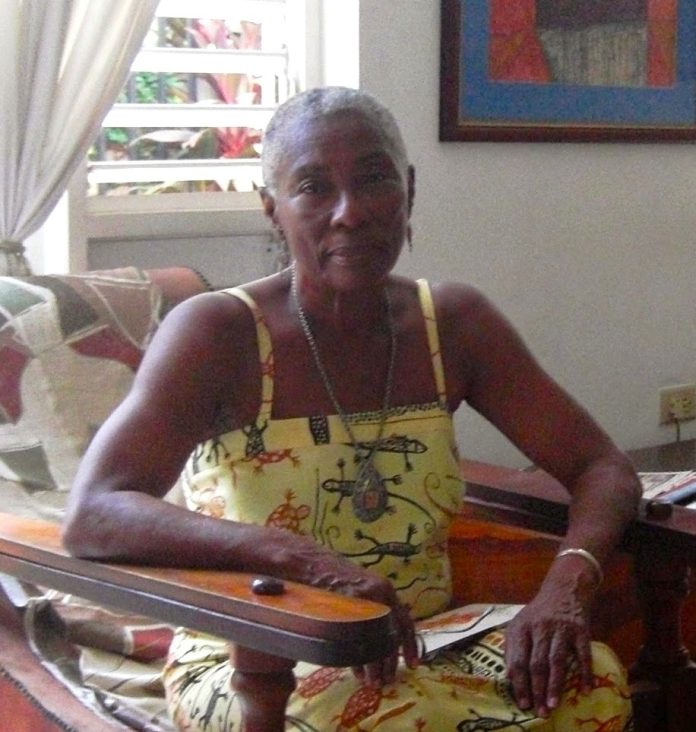KINGSTON, Feb 24 (IPS) – Jamaican writer Velma Pollard provided a special kind of sunlight in the Caribbean literary space. Known across the region for her warm personality and welcoming nature, she also defied simple classification as she shone beyond genre. The work she has left behind encompasses short stories, poetry, academic writing, and novellas. She was also a keen naturalist photographer.
An early poem, “A Case for Pause”, reflects on the interconnections between all the forms she used: “Arrest the sense / and let the fancy flow / Without design / collecting cloud and air / petal and leaf … Rein in the fancy now / unleash the sense … constructs and theories not yet pursued / rush in perfected, whole,” she wrote.
Her sudden death earlier this month, on Feb. 1, has created a huge gap in the lives of those who loved and admired her as a person and poet and who must now draw solace from reading or revisiting her work. Her generosity to other writers, scholars, and artists was legendary in the Caribbean and internationally. In the days and weeks before her passing, and despite her incapacity from a fall and subsequent operation, she took pains to read and comment on work that young writers sent her, carefully and unsparingly collating her responses.
As fellow Jamaican author and academic Earl McKenzie said after her funeral service on Feb. 21: Dr Pollard “was a friend and supporter of her fellow writers, and we all miss her”. Her long-time friend and colleague, Dr. Elizabeth “Betty” Wilson, added that the service was “an outpouring of love”.
Born in 1937, in the parish of St. Mary on the north-eastern Jamaican coast, Dr Pollard spent her early years in a rural setting along with siblings that include her equally renowned sister Erna Brodber.
She later attended Excelsior High School in the capital Kingston, where she won several elocution contests, and she gained a scholarship to continue her studies at the University College of the West Indies, focusing on languages.
Afterward, she earned a Master’s degree in English at New York’s Columbia University, and another Master’s – in education – from McGill in Canada, followed by a PhD in language education at the University of the West Indies (UWI). She would go on to become dean of the education faculty at UWI, inspiring numerous students, while also raising her three children – one of whom has said she was the strongest woman he knew, with the largest circle of faithful friends.
Dr Pollard lent her presence and expertise to important scholarly and literary conferences around the world, often writing about her experiences. She once joked that a self-important critic had remarked that every time she attended a conference, she “just had to write a poem”. But that talent for acute observation and for recording the places she visited and the people she met forms part of the richness of her work. In the poem “Bridgetown”, she writes for instance: Because the sea / walks here / this city / hands you heaven.
She addressed myriad issues in her work: family relationships, gender, colonialism (and its legacies), history, love, injustice. Many of her poems are tributes to the everyday struggles of ordinary women, the unlettered makers of “hot lunches and hot clothes / cooking and stitching miracles / with equal hand”.
Her landmark scholarly publication Dread Talk: The Language of Rastafari remains a must-read for linguists and others, while her distinctive fiction – including Considering Woman I & II – places her among the Caribbean’s best short story writers. In 1992, she won the Casa de las Americas Prize for Karl and Other Stories (which is being relaunched this year as a Caribbean Modern Classic by a British-based publisher); and, with Jean D’Costa, she also edited anthologies for young readers, including the essential Over Our Way.
Her poetry stands out for its imagery, symbolism and use of Jamaican Creole, or nation language, with collections such as Crown Point and Other Poems, Shame Trees Don’t Grow Here, The Best Philosophers I Know Can’t Read and Write, and Leaving Traces.
Her work has likewise appeared in a range of international anthologies, including Give the Ball to the Poet, which sought to “represent the past, the present and the future of Caribbean poetry”, as Morag Styles, Professor of Children’s Poetry at Cambridge University and one of the editors of the anthology, said when it was published in 2014.
Years before that, Dr Pollard’s writing was included in the ground-breaking 1989 collection Her True-True Name: An Anthology of Women’s Writing from the Caribbean, edited by Wilson and her sister Pamela Mordecai, and including other acclaimed authors such as Maryse Condé and Merle Hodge.
Then in 2018, one of her stories was translated into Chinese and included in the compilation Queen’s Case: A Collection of Contemporary Jamaican Short Stories / ??? ??????????, among the first such publications in China.
Dr Pollard was perhaps foremost a poet, but she was equally a scholar, editor, educator… an overall literary star. When she contracted meningitis several years ago, messages flowed in from all over the globe (as tributes are now doing upon her passing).
Following her recovery from that bout with meningitis, she told friends she felt the need to do “something worthwhile every day”, as a way of giving thanks for her survival. Part of this naturally included writing, but it also involved taking care of her extended family and being there for her friends and community.
As her sister Erna said at the farewell service, Dr Pollard got “10 out of 10 out of 10 out of 10” for following the commandment: love thy neighbour as thyself. The work she has left behind may be considered a testament of that love, and light, too.
© Inter Press Service (2025) — All Rights Reserved. Original source: Inter Press Service




